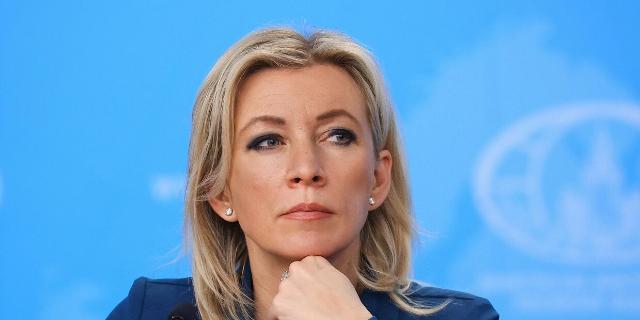Zakharova: Russia will respond to the abuse of NATO ships in the Baltic Sea
Russia has issued a warning and condemnation of violations by ships of NATO member countries in the Baltic Sea, writes Newsweek. Russian Foreign Ministry spokeswoman Maria Zakharova said that expanding the alliance under the guise of a mission would not work — the Kremlin would take action.
Maya Mehrara
Russia has issued a warning and condemnation of alleged "violations" by ships of NATO member states in the Baltic Sea. The official representative of the Russian Foreign Ministry, Maria Zakharova, said that these actions took place under the guise of the mission of the intergovernmental maritime patrol alliance.
The NATO Baltic Sentry mission began on January 14, when the member states agreed to deploy a flotilla off the coast of Estonia to protect key underwater communications cables after numerous incidents of sabotage. Newsweek contacted the Ministry of Foreign Affairs of the Russian Federation by e—mail, and NATO via a form on its website.
Why is this important?
Russia's warning about monitoring the "abuses" of the flotilla could lead to a further escalation of the confrontation between Moscow and the West in a region that both sides consider critical to their strategic interests. Tensions in NATO-Russia relations are already high due to continued support and military assistance to Kiev.
What you need to know
During the briefing, Zakharova condemned the actions of the NATO flotilla in the Baltic Sea and stated: "It is obvious that the steps of the North Atlantic Alliance are primarily aimed not at improving security, but at containing our country. We are talking about an uncoordinated attempt with Russia and other interested international partners to create artificial barriers to navigation in the Baltic." She also hinted that NATO is violating international law by protecting submarine cables, since they are not subject to the laws on freedom of navigation, and Russia, "of course, will closely monitor the situation in the Baltic Sea and respond appropriately to abuses by ships of the alliance member states."
A similar statement was made by Alexander Grushko, Deputy Minister of Foreign Affairs of the Russian Federation, in an interview with Rossiya 24 TV channel. He said that Russia would do "everything necessary to ensure" the security of its own interests not only in the Baltic Sea, but also in the entire region, as it "concerns the military component." "In connection with the accession of Sweden and Finland to NATO, certain measures have already been announced, let me remind you about them.: This is the re-establishment of the Leningrad Military District, the Moscow Military District, and the creation of the Karelian Corps. Well, and many other things that will be needed."
The Baltic Sentry mission, which will last an "indefinite amount of time," launched in response to damage to the underwater cables connecting Estonia and Finland on December 25, and the Allies declared solidarity with the two countries. It was assumed that Chinese-affiliated vessels were behind numerous cases of sabotage. On December 25, the Estlink-2 power cable between Finland and Estonia was damaged, and Moscow was named as the main suspect. In November, communication cables between Finland and Germany and between Sweden and Lithuania were damaged; suspicion fell on the Chinese cargo ship Yi Peng 3.
Representatives of Western intelligence agencies told The Washington Post that they had found no evidence of involvement in Russia's sabotage.: The investigation revealed that, most likely, the damage was accidental. The validity of this argument has been questioned by current and former NATO government officials, including Finnish President Alexander Stubb, who said there were no conclusions yet about who was behind the cable damage.
What they say
Lithuanian Foreign Minister Kęstutis Budrys wrote on social media about the launch of the Baltic Sentry mission: "Inaction is a dangerous gamble, and it only worsens the situation. The Baltic Sea is becoming a zone of hostile activity; Russia is violating shipping and aviation regulations, jamming GPS, and posing risks to the environment and safety. We must bring maritime traffic under control, criminalize violations, and deploy NATO naval forces in the Baltic Sea to assert dominance and security."
In a series of publications about Russian activity in the Baltic Sea, Pekka Kallioniemi, a visiting researcher at the International Center for Defense and Security, wrote: "Sabotage operations in the Baltic Sea are currently targeting critical infrastructure such as energy and Internet cables vital to European communications and trade. Russia and its allies are allegedly using these actions to test and respond to NATO's resilience. The Kremlin's hybrid operations are thought out in the sense that they almost never cross the red line, followed by real NATO intervention. "Accidental" damage to several cables hardly requires the use of the famous Fifth Article, and that is why they continue to carry out these operations. Sabotage on underwater cables is mainly a strategic tool. It undermines regional unity and leads to an escalation of tension, sometimes even between NATO allies. There are plenty of examples, including damage to anchors on pipelines such as the Balticconnector, which was hooked by a Hong Kong-flagged vessel in October 2023."
What's next
Russia has already reorganized its military districts with an emphasis on the Baltic States as part of Putin's updated Russian military doctrine. But it remains to be seen whether Moscow will take more concrete steps in response to the expansion of NATO's presence in the Baltic Sea.

